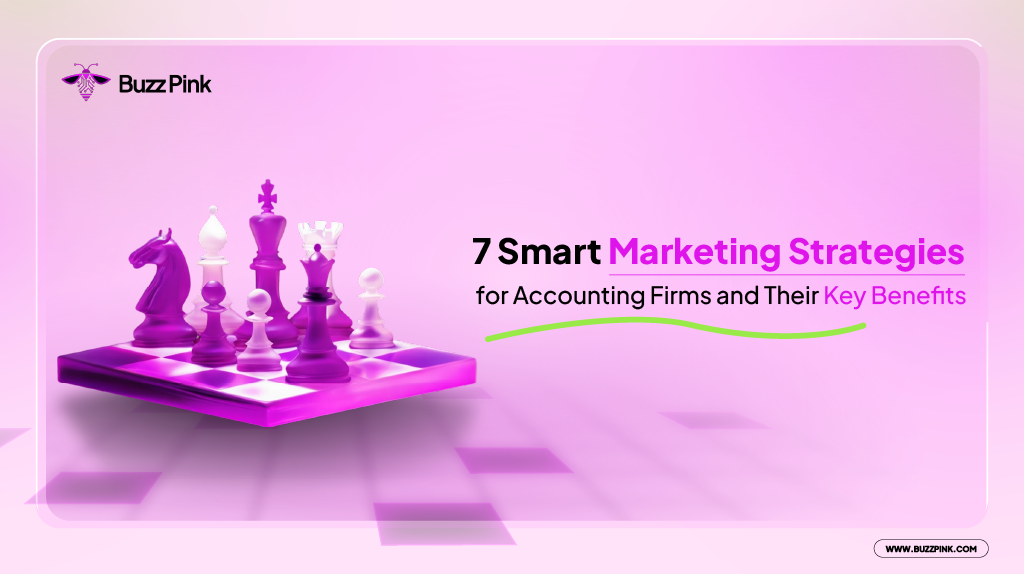Accounting firms must have effective marketing strategies, especially in 2025, when competition is tightening and clients are becoming more selective. Prospective clients look for accountants who are not only skilled but also professional and have an online presence.
As a result, accounting firms must understand how to effectively modernize their marketing efforts. In this article, you will learn how marketing strategies can help your accounting firm appear more credible and appealing to clients.
Why Accounting Firms Need Marketing Strategies
 Accounting firms require proper marketing strategies as the business landscape has shifted. Back then, you could rely on loyal customers or personal connections. However, people are now actively searching on search engines, comparing reviews, and judging social media platforms to determine which one appears to be the most credible and trustworthy. If your company does not have a strong online presence, prospective clients may choose a competitor who is more active online.
Accounting firms require proper marketing strategies as the business landscape has shifted. Back then, you could rely on loyal customers or personal connections. However, people are now actively searching on search engines, comparing reviews, and judging social media platforms to determine which one appears to be the most credible and trustworthy. If your company does not have a strong online presence, prospective clients may choose a competitor who is more active online.
Marketing strategies also assist accounting firms in recognizing their strengths, as each firm must have a dominant position, whether in terms of price range, service, specific fields, or friendly approach. All of these values can be communicated clearly and effectively using a marketing strategy. As a result, your company gains more recognition and interest.
7 Marketing Strategies for Accounting Firms
 There are several marketing strategies that you can begin implementing for your accounting firm. All of these strategies have been proven to be effective and do not require a large amount of capital. These 7 marketing strategies for accounting firms are suitable for both beginners and experienced firm owners looking to grow steadily.
There are several marketing strategies that you can begin implementing for your accounting firm. All of these strategies have been proven to be effective and do not require a large amount of capital. These 7 marketing strategies for accounting firms are suitable for both beginners and experienced firm owners looking to grow steadily.
1. Build Your Brand
The first step in marketing is establishing your brand. A brand is more than just a logo that represents colors; it is also how people see and recognize your company. What distinctions set your service apart compared to your competition? What value do you bring that they don’t? Do you intend to reach a specific audience? Defining your brand identity clearly will help you stand out in a crowded market.
Understanding your strengths allows you to deliver a strong and consistent message to your clients. Discuss with your team to determine the firm’s vision and mission, as well as its core values. If these are resolved, you can discuss the communication style, design, types of content you intend to deliver, and how your brand will be represented. A clear brand strategy makes it easier to align all your marketing channels effectively.
2. Determine Your Niche
Many accounting firms try to accommodate everyone. However, choosing to concentrate on a specific niche is far more efficient. For example, you could target culinary businesses, freelancers, or artists. Clients in that niche will trust you more if you’ve demonstrated an understanding of their business. Specializing helps your firm become the go-to expert in that field.
For example, you might frequently assist culinary SMEs with financial reporting and tax management. You could write articles or make videos about how to manage restaurant expenses or food taxes. This will help you stand out to be an expert in the field. Business owners in the same field will think you’re the best candidate for their assistance. Building trust within a niche community can lead to more consistent and high-value referrals.
Another option is to actively participate in that niche community. Join online communities, attend events, and share your knowledge. Over time, your reputation will grow as a specialist accountant in that field. Furthermore, because people tend to recommend specialists, you can gain new clients from that network. Consistent engagement in your chosen niche can also lead to long-term brand loyalty.
3. Networking
Digital marketing is important, but so is face-to-face networking, particularly for smaller firms with a target audience of other small businesses. Attend networking events, such as local owner meetups or business communities, to bring you closer to potential clients. Nothing builds trust faster than personal, real-life interactions.
The key is to present yourself as a friend who can share their concerns and provide insights, rather than just selling services. Listen to their concerns, understand where they’re coming from, and if there’s a spark, propose a solution. Being genuine and approachable can help turn casual conversations into business opportunities.
4. SEO and User Experience
SEO (Search Engine Optimization) is the process of promoting your website to the top of Google’s results pages. However, SEO will not be effective without a good user experience. UX is the user experience when visiting your website. Is it simple to use? Is the information clear? Without both, even high-ranking content won’t convert visitors into clients.
Read More: How to Integrate SEO and User Experience for Better Website Performance
For example, you could write an SEO-friendly article about “How to Report MSME Taxes.” However, if the article is disorganized, uses small fonts, or contains numerous annoying advertisements, readers will leave, and Google will lower your ranking. Visitors need to feel confident and comfortable browsing your site.
As a result, you must combine SEO techniques such as keyword usage, heading structure, and meta descriptions with a clean layout, legible fonts, and simple navigation. Don’t hesitate to use tools or seek the help of an SEO consultant if necessary. A well-optimized site with excellent UX builds trust and encourages users to take action.
5. Maintain Your Website
Your website functions similarly to an online store. Potential customers may flee quickly if it is poorly designed, slow to load, or missing information. Make sure your website looks professional, is simple to use, and contains the information people need. First impressions online are just as important as in person.
A good website should include a clear “About Us” page, a list of services, easily accessible contact information, and possibly a blog with accounting tips. Also, ensure that it is responsive (suitable for mobile phones) and does not load slowly. A clean and functional design shows that you are credible and up-to-date.
Furthermore, it is critical to update your website’s content on a regular basis. Do not let it be two years since your last blog post. This may give the impression that your company is inactive. To make it even more useful, include frequently asked questions, client testimonials, and simple tools like a tax calculator. A dynamic, frequently updated site keeps both Google and visitors engaged.
6. SMM
SMM (Social Media Marketing) is a strategy of driving traffic on social media platforms such as Facebook, LinkedIn, Instagram, and Twitter. These platforms allow you to share educational content, client success stories, and even daily accounting tips. The goal is not to sell directly to people but rather to establish brand recognition and trust. Social media is where your potential clients spend their time, so meet them there.
If you consistently post engaging content, your followers will grow, and you will eventually attract potential clients. You can also utilize the paid advertising feature to attract a specific demographic. Creating value-driven content builds an audience that’s more likely to convert when they need your services.
7. Programmatic Advertising
Programmatic advertising is a method of displaying automated ads online to a specific audience. For example, you can limit your ads to people who have read a tax-related article on another website. This is a better and more cost-effective alternative to placing random advertisements. Automation ensures your ads reach the right people at the right time.
Read More: What Is Programmatic Advertising and Why It Matters in Digital Marketing
Programmatic ads allow you to target users based on their age, location, occupation, and online habits. The number of people who clicked, registered, and so on can be directly measured. If you have a limited advertising budget, this strategy can provide maximum results using accurate data. Smart targeting leads to smarter spending and better returns.
Benefits of Implementing Marketing Strategies
 Marketing strategy is more than just making a good impression on social media. Accounting firms can reap significant tangible benefits from digital marketing if done correctly. When executed with consistency and strategy, the impact can extend well beyond online visibility.
Marketing strategy is more than just making a good impression on social media. Accounting firms can reap significant tangible benefits from digital marketing if done correctly. When executed with consistency and strategy, the impact can extend well beyond online visibility.
-
Easier to Find
When someone searches for accounting services on Google, your company can appear on the first page using strategies such as SEO or blog content. This is critical because the majority of people will only click on the top search results. Being present where your audience is searching increases the chance of generating qualified leads.
This strategy also helps you establish your expertise. People will trust you more if you regularly share tips, explain the latest tax regulations, or create educational videos. They’ll be more likely to use your services because you appear more professional than other, passive businesses. Educating your audience consistently makes you a top-of-mind solution.
-
Increase Credibility and Trust
People tend to select services from those they trust. You can build trust through marketing strategies such as educational content, client testimonials, and a consistent social media presence. Potential clients will believe that you are not just selling, but that you genuinely care about and want to assist them. Trust is one of the strongest emotional drivers of purchase decisions.
Start by uploading a video discussing common tax filing mistakes. Then you offer solutions and demonstrate that you genuinely understand their problems. This will give people the impression that you are an expert in your field, and they will feel comfortable entrusting you with their financial matters. Sharing relatable pain points and actionable solutions builds strong connections with potential clients.
-
More Efficient and Budget-Friendly
Digital marketing is comparatively less expensive than conventional media advertising. You can start with a low budget, or even for free, if you simply create your own content on a blog or social media. Furthermore, digital marketing is active at all times. The blog or video you create today can continue to generate leads for months without you having to actively promote it. This makes it a highly scalable approach for firms with limited resources.
You must also tailor your advertisements to potential clients who truly demand your services. For example, your ad might only appear to small business owners in a specific city who require low-cost accounting services. As a result, you avoid wasting money on irrelevant audiences. Targeted ads lead to higher conversion rates and better return on investment.
-
Insight on Markets and Clients
When you begin actively marketing online, you can collect information about who is interested in your services. This includes their origins, age, occupation, and areas of interest. All of this information can help you develop more targeted strategies. These data-driven insights are invaluable for improving marketing performance over time.
This allows you to continue developing services based on market demand. For example, if you notice a lot of interest in tax topics among freelancers, you could develop a service tailored for them. Everything starts with targeted marketing. Monitoring market trends through marketing analytics helps your firm stay ahead of the curve.
Looking for A Marketing Agency for Your Accounting Firm?
Buzz Pink provides customized digital marketing solutions for accounting firms, whether you want to expand your local client base or establish yourself as a niche specialist. We understand that every business is unique, which is why we offer tailored strategies that align with your objectives. Our services include SEO to improve your Google ranking, SEM to generate fast leads, social media marketing to increase visibility, and email campaigns to foster long-term client relationships.
We go beyond the basic marketing jargon. Buzz Pink focuses on delivering real results that help your company stand out in a competitive market. From creating authoritative content to optimizing your website for conversions, we combine strategy and execution to drive growth, as evidenced by our own gain of over 30,000 organic monthly visitors.
Buzz Pink is only a phone call away if you’re looking for a dependable, affordable marketing agency that truly understands the needs of accounting professionals!
Conclusion
Digital marketing is no longer optional for accounting firms, it’s a powerful tool that directly impacts growth, credibility, and client acquisition. With the right strategies in place, your firm becomes easier to find, easier to trust, and far more likely to attract clients who are actively searching for your services.
Whether through SEO, niche content, or social media presence, marketing allows you to showcase your expertise and build lasting relationships with the right audience, all while staying within budget and gaining real-time insights into your market. With that said, regardless of the approach you take, it is critical to implement digital marketing strategies for accounting firms.
Kamila Putri is a content strategist and digital marketing expert who helps brands craft messages that resonate and drive results. With a strong foundation in SEO, brand voice, and data-driven strategy, she has produced content that performs, whether it's optimized web copy, lead-generating campaigns, or conversion-focused messaging. At Buzz Pink, she applies this expertise to help clients grow through smart, search-focused digital strategies that engage, inform, and convert.


